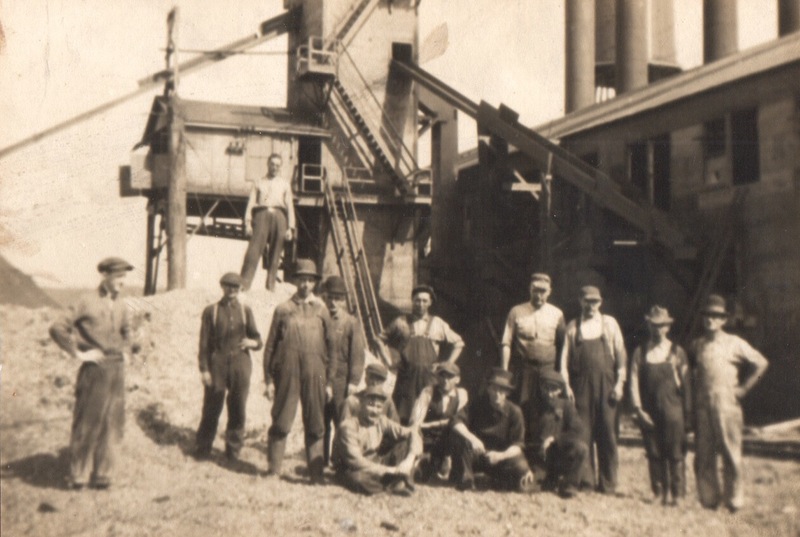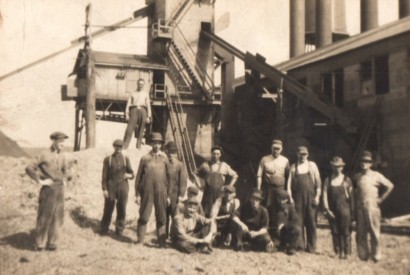Follow-up: Aetna Explosives Co. at Mount Union

Last week I wrote a post about the September 1916 explosion at the Aetna Explosives Company’s factory in Mount Union, Pennsylvania. Following up with additional newspaper research, I found that this explosion wasn’t the first, nor was it the last. Here’s what I’ve been able to piece together regarding the history of this factory. 1
Timeline:
1915
- Week of May 19, 1915: Purchased Westbrook farm
- 25 May 1915: William Hocker’s first child was born in Harrisburg
- 1 July 1915: Plant scheduled to open
- 14 July 1915: Two workmen died in accident
- 16 August 1915: Started manufacturing explosives
- 15 September 1915: Factory started manufacturing gun cotton
- 24 September 1915: Workmen burned by acid when ringer exploded, one man seriously burned
- 5 October 1915: Four workmen badly burned on their faces and bodies by acid in accident
- 14 October 1915: Plant was looking for 1,500 workmen (1,000 carpenters) to expand
- 11 November 1915: First shipment of gun cotton, 150,000 pounds, sent out
- 18 November 1915: Started manufacturing smokeless gun power
- 22 November 1915: Ether room at the factory exploded
- 2 December 1915: Broke ground for factory expansion
- 19 December 1915: Footbridge to factory washed away after flooding in the Juniata River
1916
- 7 January 1916: Solvent Recovery Building No. 3 burned down
- 14 January 1916: Fire at factory
- 16 January 1916: Fire in the “screen barrel house” at factory; third fire in one week
- 25 March 1916: Powder plant almost a year old
- 26 April 1916: Worker Harry Pierson lost his right hand at wrist when it was caught under a hydraulic press
- 16 May 1916: Three fires overnight in cotton drying building
- 2 July 1916: Explosion at least one dead2
- 29 July 1916: Aetna received order for 5 million pounds of smokeless power from U.S. government
- 12 September 1916: H. Subree, an Aetna chemist, was bitten by a copperhead snake
- 20 September 1916: Six men killed and many injured in explosion in the cotton dry house
- 2 October 1916: Powder plant closed down
- 12 October 1916: Plant planned to open to manufacture dyes and sulphuric acid
- 16 October 1916: Last smokeless powder manufactured
- 21 November 1916: Powder plant to reopen with large order for explosives, planned to hire 1,500-2,300 men
- 2 December 1916: Powder plant resumed operations
1917
- 17 January 1917: Solvent recovery building completely destroyed by fire, no one was badly hurt
- 18 April 1917: Debtors applied for receiver to be named for Aetna Explosives Company
- 30 April 1917: Acid tank exploded, badly burning six men, one of whom—David Sollenberger—later died
- 5 Jun 1917: William Hocker registered for the draft and was working at the factory as a millwright
- 17 July 1917: Two men—Lew Port and John Flasher—were seriously burned in an explosion at the plant
- 24 December 1917: Fire at the plant caused about $60,000 worth of damage
- 29 December 1917: Citizens of Mount Union signed up to become members of the local Red Cross chapter
1918
- 19 January 1918: Seven state policemen arrived to guard two million pounds of TNT powder
- 2 July 1918: Seven buildings were destroyed by raging fire at the plant, however there was no loss of life
- 13 July 1918: 300 men arrived to repair the damaged building and expand the plant
- 15 July 1918: Nine men were injured, possibly five fatally, by explosion in the gun cotton building
My great grandfather was working at the Aetna Explosives Company manufacturing plant at Mount Union by 5 Jun 1917.3 In reading through the news reports on the company after that date, I see nothing that matches the family story. There were fires that destroyed buildings and resultant injuries, but no loss of life. I can’t imagine that there would have been no news coverage of an explosion that killed workers.
So, if the explosion my grandfather told me about didn’t happen after 5 June 1917, then it must have happened before that date. Again, in 1917, I found reference to explosions, fires and burn injuries, but only one casualty is mentioned—David Sollenberger in April 1917. The only explosion that resulted in multiple deaths that was reported consistently in the Pennsylvania newspapers I reviewed was the September 1916 explosion.
There was a mention in the Gettysburg Star & Sentinel of an explosion in October 1916 that killed 19 men.4 This was also reported in the Chicago Livestock World in an article about another explosion in January 1917.5 This explosion seems a better match to the family lore.
However, I found no mention of the October 1916 explosion in Pennsylvania newspapers when I searched Chronicling America or the Google newspaper archive. With such a substantial loss of life, the lack of newspaper coverage seems very strange to me. Especially when the Harrisburg newspapers reported on the layoff of workers from Mt. Union and the “closing” of the factory that month and the reopening a month later.
I’d still like to review Harrisburg city directories to try to determine when my great grandfather and his family left Harrisburg for Newton-Hamilton. Maybe that’ll help narrow down the time frame to look for a historical match to the family story.
Updated 27 November 2016: Add a reader-sourced explosion and death (2 July 1916) to the timeline.
Footnotes
- The articles are from the Harrisburg Telegraph, available on Chronicling America. ↩
- This information came from a reader who has a death certificate for a relative that lists an explosion at the factory as the cause of death on this date. Thanks for sharing! ↩
- Mifflin County, Pennsylvania, World War I Draft Registration Card (no. 155), William Howard Hocker, 5 Jun 1917; index and images, FamilySearch, “United States World War I Draft Registration Cards, 1917-1918″ (https://familysearch.org/ : accessed 24 Aug 2014); citing NARA micropublication M1509, roll number 145. ↩
- “Explosion Wrecks Aetna Plant at Mt. Union; Loss of Life Unknown,” The Star & Sentinel, 18 Jan 1917; online archives, Google News (http://news.google.com : accessed 26 Aug 2014); citing original image, page 1, column 3. ↩
- “Daily News Condensed,” Chicago Livestock World, 18 Jan 1917; online archive, “Illinois Digital Newspaper Collections,” University of Illinois at Urbana-Champaign (http://idnc.library.illinois.edu : accessed 12 Sep 2014); citing image, page 2, column 5. ↩
Cite This Page:
Kris Hocker, "Follow-up: Aetna Explosives Co. at Mount Union," A Pennsylvania Dutch Genealogy, the genealogy & family research site of Kris Hocker, modified 27 Nov 2016 (https://www.krishocker.com/follow-up-aetna-explosives-co-at-mount-union/ : accessed 21 Apr 2025).
Content copyright © 2016 Kris Hocker. Please do not copy without prior permission, attribution, and link back to this page.
2 Replies to “Follow-up: Aetna Explosives Co. at Mount Union”
Comments are closed.


I found your articles after trying to research a ring my grandfather made from gun powder that I possess. It looks like cordite. Both my grandfather and my grandmother worked at the powder plant. That is where they met. My grandfather put a note in a funnel that had powder going down it and she found the note while working. We also still have that note asking if she wanted to go for a ride. They were in a boat crossing the river when the explosion happened. They saw all the smoke and heard the noise. I find it extremely interesting that a John Flasher is mentioned in your article since my great great grandfather went by the name. Harry Flasher was my grandfather and Gertrude Larue Berrier was my grandmother. She lived in Mt Union. I think Orbisonia or Three Springs is where my grandfather lived. Thank you so much for sharing this information and research with all of us!
Look at Gendisasters for Aetna explosion near Pittsburg. Dec 1917, 10 killed.